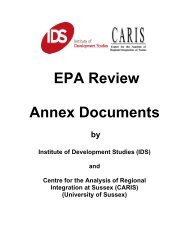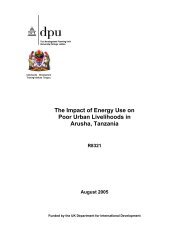Policy Levers in Malaysia - Department of International ...
Policy Levers in Malaysia - Department of International ...
Policy Levers in Malaysia - Department of International ...
Create successful ePaper yourself
Turn your PDF publications into a flip-book with our unique Google optimized e-Paper software.
CRISE <strong>Policy</strong> Context Paper 4, May 2004<br />
predom<strong>in</strong>ant political force for the Malays ever s<strong>in</strong>ce. The British backed down, and a<br />
federal system was devised, <strong>in</strong> which was <strong>in</strong>formally enshr<strong>in</strong>ed the notorious<br />
<strong>in</strong>dependence ‘barga<strong>in</strong>’, whereby <strong>Malaysia</strong>n Ch<strong>in</strong>ese would accept Malay dom<strong>in</strong>ance <strong>of</strong><br />
the political sphere <strong>in</strong> return for basic guarantees that their bus<strong>in</strong>ess activities, which<br />
dom<strong>in</strong>ated the domestic economy, would not be underm<strong>in</strong>ed.<br />
Prior to <strong>in</strong>dependence, UMNO forged a coalition with the <strong>Malaysia</strong>n Ch<strong>in</strong>ese Association<br />
(MCA), and later the <strong>Malaysia</strong>n Indian Congress (MIC) to create the Alliance, which<br />
defeated a range <strong>of</strong> more multiethnic unitary parties to form the first government. The<br />
Alliance, a triumvirate <strong>of</strong> ethnically-based political parties represent<strong>in</strong>g the three ma<strong>in</strong><br />
communities, has been widely held up as the example <strong>of</strong> consociational democracy <strong>in</strong> a<br />
multiethnic society par excellence (e.g. Lijphart 1977). Led by the outwardly benign<br />
prime m<strong>in</strong>ister Tunku Abdul Rahman, the Alliance adm<strong>in</strong>istration followed a broadly<br />
laissez-faire policy approach, reflect<strong>in</strong>g the <strong>in</strong>dependence ‘barga<strong>in</strong>’. Despite the<br />
appearance <strong>of</strong> political calm, however, Malay discontent at their economic status was<br />
well<strong>in</strong>g, voiced by a new breed <strong>of</strong> UMNO ultras, <strong>in</strong>clud<strong>in</strong>g future prime m<strong>in</strong>ister Mahathir<br />
Mohamad. Inter-ethnic tensions dur<strong>in</strong>g the early 1960s were kept under wraps to some<br />
degree by the persistence <strong>of</strong> extra-national threats to <strong>Malaysia</strong>’s territorial security<br />
caused by the Indonesian policy <strong>of</strong> konfrontasi and the Philipp<strong>in</strong>es’ claim on Sabah<br />
(Means 1970). The advent <strong>of</strong> General Suharto and Ferd<strong>in</strong>and Marcos as the respective<br />
leaders <strong>of</strong> these countries <strong>in</strong> the mid 1960s saw the resolutions <strong>of</strong> these tensions, as<br />
both leaders committed themselves to a focus on <strong>in</strong>ternal affairs and dropped their<br />
claims on <strong>Malaysia</strong>’s territory. 1<br />
At the 1969 general election, the Alliance performed badly, w<strong>in</strong>n<strong>in</strong>g less than fifty<br />
percent <strong>of</strong> the vote, although reta<strong>in</strong><strong>in</strong>g its parliamentary majority. Most notable was the<br />
virtual collapse <strong>in</strong> its support amongst non-Malays, especially the urban Ch<strong>in</strong>ese; the<br />
MCA lost more than half its federal seats and the Alliance lost control <strong>of</strong> the two urban<br />
states <strong>of</strong> Penang and Selangor (Lee and Heng 2000; Ratnam and Milne 1970). 2 ‘Victory<br />
celebrations’ by the Ch<strong>in</strong>ese opposition parties and counter demonstrations by<br />
government supporters soon descended <strong>in</strong>to riot<strong>in</strong>g, which cost almost two hundred lives<br />
and six thousand homes over a three day period. The government responded by<br />
declar<strong>in</strong>g a State <strong>of</strong> Emergency, suspend<strong>in</strong>g parliament and <strong>in</strong>stall<strong>in</strong>g a National<br />
Operations Council, headed by deputy prime m<strong>in</strong>ister Tun Abdul Razak, which ruled by<br />
decree. 3 Tunku Abdul Rahman rema<strong>in</strong>ed Prime M<strong>in</strong>ister, but had <strong>in</strong> effect been stripped<br />
<strong>of</strong> his powers <strong>in</strong> a ‘palace coup’. Upon the restoration <strong>of</strong> parliament almost two years<br />
later <strong>in</strong> February 1971, Razak took over the prime m<strong>in</strong>istership.<br />
Razak’s adm<strong>in</strong>istration marked a decisive shift <strong>in</strong> policy orientation from that <strong>of</strong> his<br />
predecessor. Gone were the laissez-faire economy and the political consociationalism.<br />
In their place, the government promulgated a series <strong>of</strong> chauv<strong>in</strong>istic pro-Malay policies.<br />
The government argued that the root cause <strong>of</strong> the May 1969 riots had been the<br />
economic disparities between the Malays and the non-Malays, a legacy <strong>of</strong> the colonial<br />
adm<strong>in</strong>istration and its policy <strong>of</strong> ‘ethnic division <strong>of</strong> labour’. In an attempt to reverse this,<br />
the Razak adm<strong>in</strong>istration implemented the New Economic <strong>Policy</strong> (NEP). The NEP had<br />
two ostensible goals – the complete eradication <strong>of</strong> poverty, and the eradication <strong>of</strong> the<br />
association between ethnic group and economic role. In reality, however, it heralded a<br />
1<br />
Suharto became president <strong>of</strong> Indonesia <strong>in</strong> March 1967, although he had effectively taken control <strong>of</strong> the<br />
country follow<strong>in</strong>g the attempted coup <strong>in</strong> 1965; Marcos was elected to the Philipp<strong>in</strong>es’ presidency <strong>in</strong> 1965.<br />
2<br />
In Penang, the Alliance lost outright; <strong>in</strong> Selangor, the state assembly was evenly tied between government<br />
and opposition.<br />
3<br />
The State <strong>of</strong> Emergency was actually declared by the K<strong>in</strong>g. The NOC’s <strong>of</strong>ficial role was only as advisor to<br />
Tun Razak, who was not bound to follow this advice and thus, <strong>in</strong> effect, had absolute power.<br />
3
















